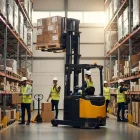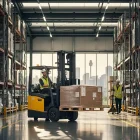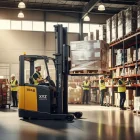When it comes to choosing an all-terrain forklift for your business, the decision between diesel and electric models can be challenging. Each type has its advantages and drawbacks, and understanding these can help you make an informed choice. Whether you’re a forklift supplier or someone looking for an all-terrain forklift for sale, this guide will walk you through the essential factors to consider.
Understanding All-Terrain Forklifts
All-terrain forklifts are designed to handle rough and uneven surfaces, making them ideal for outdoor environments such as construction sites, lumberyards, and agricultural operations. Their robust design allows them to maneuver through challenging terrains while carrying heavy loads.
Key Features of All-Terrain Forklifts
- Rugged Construction: Built with durable materials to withstand harsh outdoor conditions.
- Powerful Engines: Equipped with engines that provide the necessary power to navigate rough terrains.
- High Ground Clearance: Designed with increased ground clearance to avoid obstacles and improve mobility.
- Enhanced Traction: Fitted with specialised tires to maintain grip on loose or uneven surfaces.
Diesel All-Terrain Forklifts
Diesel forklifts are known for their power and durability, making them a popular choice for heavy-duty applications.
Advantages of Diesel Forklifts
- High Torque: Diesel engines provide significant torque, which is essential for moving heavy loads over rough terrain.
- Longer Running Time: They can operate for extended periods without the need for refueling, which is crucial for long shifts.
- Durability: Diesel engines are robust and can handle heavy use in tough conditions.
Drawbacks of Diesel Forklifts
- Emissions: Diesel engines produce emissions that can be harmful to the environment, and there may be restrictions on their use in certain areas.
- Noise: They tend to be louder than electric models, which could be a consideration in noise-sensitive environments.
Electric All-Terrain Forklifts
Electric forklifts are gaining popularity due to their environmental benefits and lower operational costs.
Advantages of Electric Forklifts
- Zero Emissions: Electric forklifts produce no emissions, making them environmentally friendly and suitable for indoor and outdoor use.
- Quiet Operation: Their operation is significantly quieter, which is beneficial in areas where noise is a concern.
- Lower Operating Costs: Electricity is generally cheaper than diesel fuel, and electric forklifts have fewer moving parts, reducing maintenance costs.
Drawbacks of Electric Forklifts
- Limited Running Time: They require recharging after a certain period, which can interrupt work unless you have spare batteries.
- Upfront Costs: The initial purchase price can be higher than that of diesel forklifts, though this may be offset by lower operating costs over time.
Factors to Consider When Choosing Between Diesel and Electric
Work Environment
Consider where the forklift will be primarily used. If your operations are mostly outdoors or in areas without emission restrictions, a diesel forklift might be suitable. However, for indoor or environmentally sensitive areas, an electric forklift could be a better choice.
Budget Considerations
Assess both the initial investment and the long-term operational costs. While diesel forklifts might be cheaper to purchase, electric forklifts can offer savings on fuel and maintenance.
Load Requirements
Examine the weight and type of loads you’ll be moving. Diesel forklifts typically offer more power, which is necessary for very heavy loads. However, if your loads are lighter, an electric forklift may suffice.
Operational Hours
Think about your work schedule. If your operations involve long shifts with minimal downtime, diesel forklifts might be more convenient due to their longer running times. For operations with scheduled breaks, electric forklifts can work well as they can be recharged during these periods.
Making the Right Choice
Choosing between a diesel and an electric all-terrain forklift depends on your specific needs and working conditions. Both types have their strengths and limitations, and the right choice will align with your operational requirements and environmental considerations.
Final Thoughts
Before making a purchase, consult with a reputable forklift supplier to explore the available options. They can provide insights and recommendations based on your industry and usage requirements. Remember, the goal is to find an all-terrain forklift that meets your needs, enhances productivity, and aligns with your environmental values.
In conclusion, whether you opt for a diesel or electric model, investing in the right all-terrain forklift can significantly impact your business operations. Evaluate your priorities, consult with experts, and make an informed decision that will support your business for years to come.




